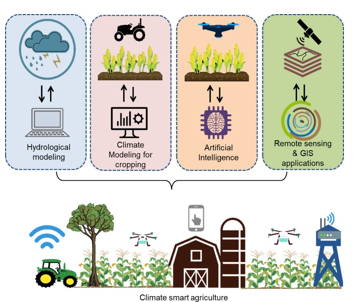INP-WealthPk
Arooj Zulfiqar
In order to address climate change impacts on agriculture, Pakistan needs to take significant steps towards developing climate-resilient technologies, said a renowned expert.

“Agricultural productivity in Pakistan has declined over the last six decades. The agribusiness growth rate was on average 4% between 1960 and 2000, 3% between 2000 and 2010, and 2%between 2010 and 2020,” said Faiz Rasool, Senior Policy Adviser at Global Alliance for Improved Nutrition (Gain), a Geneva-based foundation. Faiz emphasised that climate change has had a significant impact on agricultural productivity. Rising temperatures, erratic rainfall patterns, and increased frequency of extreme weather events pose significant challenges to the country's agricultural sector, which relies heavily on rain-fed farming.
“To tackle these challenges, Pakistan needs to actively invest in the development and implementation of climate-resilient technologies to enhance agricultural productivity and ensure food security,” he emphasised. Faiz mentioned that one of the key areas of focus in Pakistan's climate-resilient technologies development was the promotion of drought-tolerant and heat-resistant crop varieties. He said traditional crop varieties are often susceptible to water scarcity and heat stress, resulting in reduced yields and economic losses for farmers. “Through research and breeding programs, scientists should develop new varieties of crops that can withstand prolonged periods of drought and higher temperatures. These climate-resilient varieties will offer farmers a viable option to adapt to changing climatic conditions and secure their livelihoods,” he suggested.
Furthermore, he said efficient water management is crucial for climate resilience in agriculture. In a country where water resources are already under pressure, optimising water use becomes imperative. “Pakistan needs to promote the adoption of precision irrigation techniques such as drip irrigation and sprinkler systems including small-scale farmers. These methods ensure that water is delivered directly to plant roots, minimising wastage and maximising its utilisation,” he said. “Additionally, the use of moisture sensors and weather-based irrigation scheduling helps farmers make informed decisions about irrigation, ensuring that crops receive the right quantity of water at the right time,” he added.
Credit : Independent News Pakistan-WealthPk




